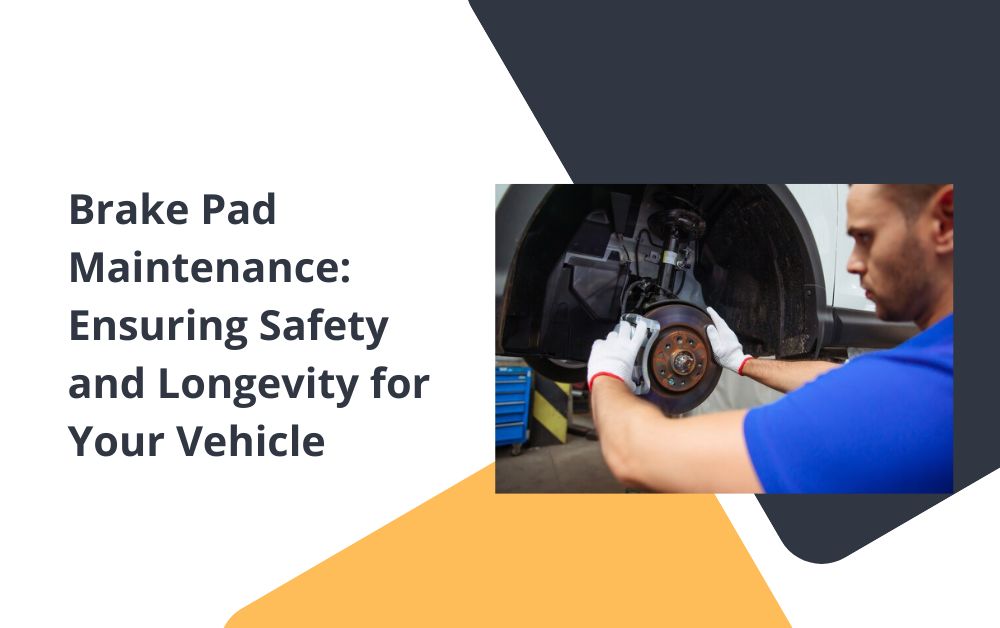Maintaining your car’s brake pads is crucial for your safety and the overall performance of your vehicle. Brake pads are a vital component of the braking system, and keeping them in good condition ensures that you can stop your car efficiently. This guide will help you understand the importance of Brake Pad Maintenance, the signs of wear and tear, the benefits of regular maintenance, and how to choose the right brake pads for your vehicle.
Why Brake Pad Maintenance is Important
Safety First
The primary reason for maintaining your brake pads is safety. Well-maintained brake pads ensure that your car stops quickly and smoothly, reducing the risk of accidents. Regular checks can help you avoid brake failure, which can lead to dangerous situations on the road.
Improved Vehicle Performance
Good brake pads improve your car’s overall performance. They provide better control, stability, and responsiveness, making your driving experience safer and more enjoyable. Regular maintenance ensures that your brake pads are always in top condition.
Cost Savings
Maintaining your brake pads can save you money in the long run. By addressing minor issues before they become major problems, you can avoid costly repairs and replacements. Regular maintenance also helps extend the life of your brake components, reducing the need for frequent replacements.
Signs That Your Brake Pads Need Attention
Squeaking or Squealing Noises
One of the most common signs that your brake pads need attention is a squeaking or squealing noise when you apply the brakes. This noise is often caused by the wear indicator on the brake pad, which is designed to alert you when the pads are getting too thin.
Grinding Sounds
If you hear a grinding noise when braking, it could mean that your brake pads are worn down completely, and the metal parts are rubbing against the rotor. This can cause significant damage to your braking system and requires immediate attention.
Reduced Braking Performance
If you notice that your car is taking longer to stop or the brakes feel less responsive, it could be a sign that your brake pads are worn out. Reduced braking performance can be dangerous, especially in emergency situations.
Vibrations When Braking
If you feel vibrations or pulsations when you apply the brakes, it could indicate that your brake pads are unevenly worn or that there is an issue with the rotors. This can affect your car’s stopping power and should be checked by a professional.
Visual Inspection
You can also perform a visual inspection of your brake pads. Look through the wheel spokes to see the brake pads. If they appear to be less than a quarter-inch thick, it’s time to replace them.
Benefits of Regular Brake Pad Maintenance
Enhanced Safety
Regular maintenance ensures that your brake pads are always in good condition, providing maximum stopping power and reducing the risk of accidents. Well-maintained brakes give you confidence on the road, knowing that your car can stop quickly when needed.
Longer Lifespan of Brake Components
Regular maintenance helps extend the life of your brake components, including the rotors and calipers. By addressing minor issues early, you can prevent more significant damage and prolong the lifespan of your braking system.
Better Fuel Efficiency
Worn brake pads can cause your car to work harder, leading to increased fuel consumption. Maintaining your brake pads helps your car run more efficiently, saving you money on fuel costs.
Cost-Effective
Regular maintenance is more cost-effective than waiting for major repairs. Replacing brake pads is relatively inexpensive compared to the cost of repairing or replacing damaged rotors, calipers, or other braking system components.
How to Maintain Your Brake Pads
Regular Inspections
Schedule Routine Checks
Schedule regular brake inspections to catch any issues early. Most experts recommend having your brakes checked at least once a year or more frequently if you drive in heavy traffic or harsh conditions.
Listen for Unusual Sounds
Pay Attention to Noises
If you hear squeaking, grinding, or other unusual noises when you brake, it’s a sign that something may be wrong. Don’t ignore these sounds – have your brakes inspected as soon as possible.
Monitor Brake Performance
Notice Changes in Braking
If you notice changes in your car’s braking performance, such as reduced responsiveness, longer stopping distances, or a soft brake pedal, it’s time for a brake check. These changes can indicate potential issues that need to be addressed.
Maintain Brake Fluid
Check Fluid Levels
Regularly check your brake fluid levels and top up if necessary. Low brake fluid can affect your braking performance. Also, replace the brake fluid as recommended by your car’s manufacturer.
Drive Responsibly
Avoid Hard Braking
Avoid hard braking whenever possible. Sudden stops can cause excessive wear on your brake pads and other components. Drive smoothly and anticipate stops to extend the life of your brakes.
Choosing the Right Brake Pads for Your Vehicle

Types of Brake Pads
Organic Brake Pads
Organic brake pads are made from materials like glass, rubber, and resin. They are softer and quieter but tend to wear out faster. They are suitable for light to moderate driving conditions.
Semi-Metallic Brake Pads
Semi-metallic brake pads are made from a mix of metal and other materials. They offer good performance and durability but can be noisier than organic pads. They are suitable for a wide range of driving conditions, including high-performance driving.
Ceramic Brake Pads
Ceramic brake pads are made from ceramic fibers and other materials. They offer excellent performance, durability, and are quieter than other types. However, they are more expensive and are best suited for high-performance vehicles.
Consider Your Driving Style
Match Your Needs
Choose brake pads that match your driving style and needs. If you do a lot of city driving with frequent stops, you might prefer organic or semi-metallic pads. For high-performance driving or towing, ceramic pads may be the best choice.
Consult a Professional
Seek Expert Advice
Consult a professional mechanic or brake specialist to help you choose the right brake pads for your vehicle. They can recommend the best options based on your car’s make and model, driving conditions, and personal preferences.
Conclusion
Brake pad maintenance is essential for ensuring your safety and the longevity of your vehicle. Regular inspections, timely replacements, and responsible driving habits can keep your brake pads in top condition, providing you with peace of mind on the road. By choosing the right brake pads for your vehicle and following a proper maintenance routine, you can enjoy a safe and smooth driving experience. Investing in regular brake pad maintenance not only enhances your safety but also saves you money in the long run by preventing costly repairs. Prioritize your brake health and ensure that your vehicle’s braking system is always reliable and efficient.
Note:-To explore additional articles, check out kinkedpress.




